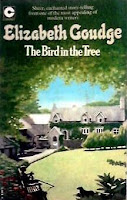 |
| (Amazon UK link) |
I first read ‘The Bird in the Tree’ in 1997, after finding it in a charity shop. I was delighted to do so, as I’d read its sequel, ‘The Herb of Grace’ many years earlier, and had been looking for this book for a long time. Each book stands alone, featuring different storylines; yet there’s a richness to the second which becomes deeper after reading and feeling part of the events of the first one. I re-read this in 2004 so I decided it was time to read it again.
The book starts with great excitement: David is coming to stay at Damerosehay! Its owner, Lucilla, is 78 and beginning to become frail, although she’s a determined lady who usually gets her own way. She’s created a haven for her family, and has the care of her three young grandchildren, Ben (who is 9) and his younger siblings Tommy and Caroline. Their parents are divorced; their father works in India, and their mother isn’t naturally maternal.
David is another of Lucilla’s grandsons, now grown-up and beloved by everyone. However it’s evident to all that he has a big problem, something he needs to talk about, but doesn’t know quite how to start. The book, at one level, is about his news, the reactions of those around him, and a difficult decision he has to make. But it’s also about the house itself: its history, the people who built it and lived there before Lucilla bought it. It’s about the children, too: one highly sensitive and intuitive; one impulsive, living for the moment; one insecure and worried.
At a deeper level the book is about the nature of truth: of the difference between factual accuracy and deeper insights or images that portray truths. It’s about being true to oneself and one’s family, of making difficult decisions, of faithfulness and tradition. It’s about generational differences in the way people see the world, and also about eternal truths which can transcend simple facts - of events that point to truth, and ways of behaving or acting that can bring about different truths.
This isn’t a book for those who want a quick read, nor for those who like fast plots and rapid action. It’s likely to appeal more to women than to men, despite David being one of the most important characters, but that’s perhaps because on the whole women are more likely to read thoughtful, philosophical books.
I think it could be of interest and perhaps benefit to anyone prepared to take the time to read it, however. Naturally the moral climate (and, indeed, the harsh ‘discipline’ used in some cases on the children) seem rather old-fashioned, but while some changes are undoubtedly for the better, there’s a lot to be said for Lucilla’s way of looking at the world.
Sometimes moving, often thought-provoking, and with an encouraging ending.
Review copyright 2016 Sue's Book Reviews
No comments:
Post a Comment